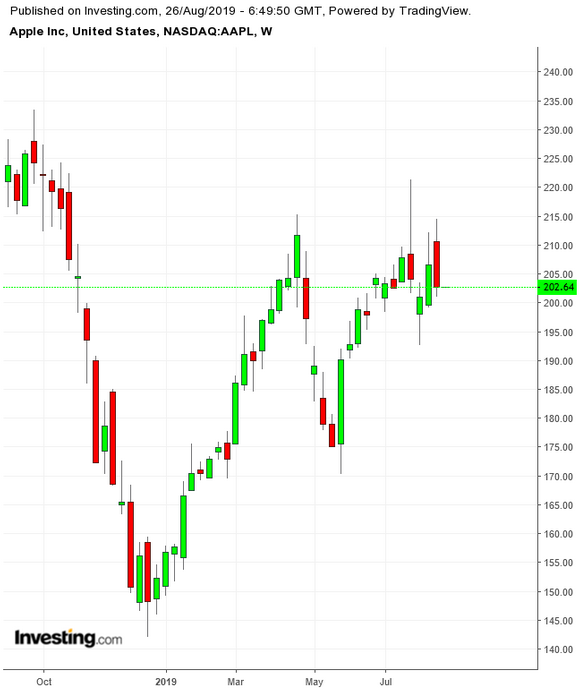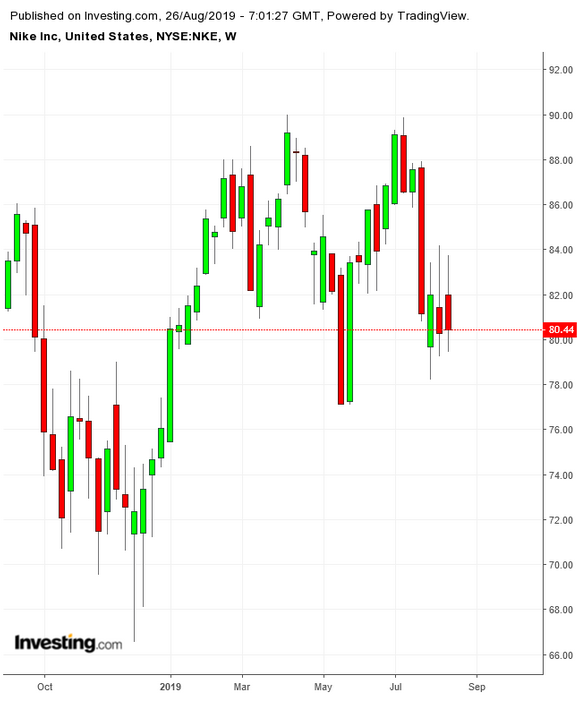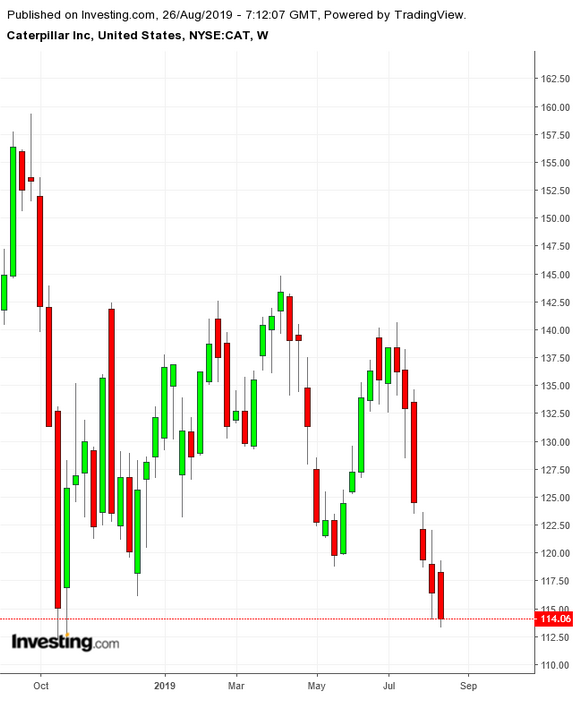It’s anybody’s guess how and when the U.S.-China trade war will end. But the past week saw a dramatic acceleration in hostilities when both countries escalated tit-for-tat tariff measures, suggesting respective positions were hardening, even after two years of negotiations.
Some of these tariffs are scheduled to take effect from Sept. 1, hitting some of the largest U.S. companies which will feel the direct impact of this dispute due to their significant presence in China. To provide some understanding of the risks involved for American companies, we're focusing on three large cap stocks in order to explain their stake in this dispute.
1. Apple
The maker of the iPhone, Apple Inc (NASDAQ:AAPL) has a lot to lose in this fight between the world's two biggest economies. After China announced on Friday that it plans to levy tariffs on another $75 billions of U.S. goods, Apple shares plunged 4.6%.

China is Apple’s third largest market, bringing in nearly $52 billion in sales in the company’s most recent fiscal year. Worries over the trade war impact on Apple intensified in May, after the U.S. blacklisted Huawei Technologies, raising fears that China might target Apple and its supply chain.
The majority of Apple’s products are due to be hit with 10% tariffs in the next weeks or months. Levies on the iPhone, iPad, and Apple laptops have been pushed back to Dec. 15, but the tariff blow on the Apple Watch, AirPods, and many accessories is still planned for Sept. 1.
In a recent meeting, Apple CEO Tim Cook reportedly told President Trump that Apple’s products will be at a disadvantage when compared to its chief rival Samsung (OTC:SSNLF) if Apple products are subject to import tariffs. A recent note from Goldman Sachs presents a worst-case scenario: Apple’s earnings would take a 29% hit if China were to retaliate against the U.S. with a ban on sales of the iPhone maker’s products.
That scenario, in our view, is highly unlikely given Apple’s huge investment in China and its impact on the local economy. But Apple stock will certainly see more weakness if this dispute lingers, threatening its 30% rally so far this year.
2. Nike
Sportswear giant, Nike Inc (NYSE:NKE) is another mega cap consumer stock that's vulnerable to a trade conflict. Indeed, the company is already being punished by the lingering dispute, with concerns mounting that rising tariffs on its imports from China will threaten its brand and reduce sales.

After surging to a record high of $90 a share in April, Nike stock has fallen about 11% since the U.S. and China imposed tit-for-tat tariffs on each other’s imports. Nike shares slipped 3.4% on Friday to close at $80.44.
However, digging a little deeper, it becomes apparent that the risks to the world’s largest sports apparel company aren’t actually that big. Nike has been consistently diversifying its production away from China — a strategy that's made it less exposed to tariffs on Chinese imports.
About 26% of Nike’s footwear and apparel were made in China last year. But according to Susquehanna Financial Group, less than 10% of that is imported to the U.S.
During its last earnings call, Nike executives downplayed the China risks by saying the trade war didn’t impact Nike as yet since the company continues to source products from China. That being said, Nike shares won’t be able to withstand a sharp sell-off in China-exposed stocks and weakness in its shares might accelerate if we see trade tensions continue.
3. Caterpillar
Shares of powerful mining and construction equipment maker, Caterpillar Inc (NYSE:CAT), have been under pressure too, on concerns that the company won’t be able to escape the slowdown triggered by the trade war. Its stock fell more than 3% on Friday, to $114.06, adding to a 13% decline in the past month.

Caterpillar recently said tariffs on Chinese imports are expected to increase its materials costs by up to $200 million in the second half of 2019. The heavy machinery maker plans to offset most of the higher costs with mid-year price hikes.
But that strategy is unlikely to save the machinery giant from a widespread manufacturing slowdown that’s hitting both the U.S. and China. Caterpillar, considered to be an economic bellwether, warned this year that the global economy is slowing faster than expected, which will hit its sales.
In the most recent quarter, the heavy-equipment maker said its 2019 earnings will be at the low end of its forecast due to rising costs, declining sales in Asia and a slowdown in oil and gas spending in the prolific Permian Basin. China represents between 5-10% of Caterpillar’s total revenue.
